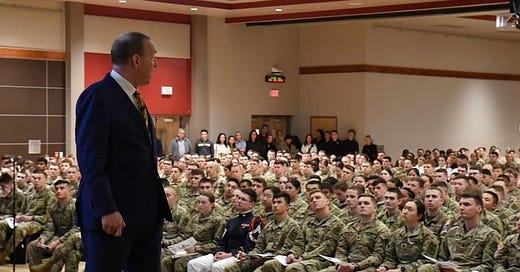And we’re off …
Jeffrey Itell
In 2060, when the United States (or emboldened Canada) consolidates the Americas politically and Latin America has adapted or moved, how do you envision Pax Americana interacting with emerging global power blocs? What is your ideal scenario?
Keeping it simple:
A politically unified Western Hemisphere prioritizes near-shoring critical industries to reduce dependency on external powers like China and Europe.
U.S. continues as hemispheric “security exporter,” helping partners like Brazil and Mexico stabilize their neighborhoods through joint counter-cartel operations and disaster-response networks.
More generally, climate disruptions force temperate-zone nations (North America, Europe, East Asia bloc) to collaborate on managing migration, food security, and energy transitions, while — for the most part — cooperatively stabilizing any overlapping supply chains and counterbalancing Middle Earth states facing destabilization.
China and India dominate Asian integration and the US lets Asia be Asia without containment ambitions.
Europe has stepped up its unification, and has begun a certain amount of state accession efforts southward, starting in North Africa and the Middle East but leaving Sub-Saharan Africa to the Asians led by India.
Russia is marginalized as a far looser federation, having been pulled in all directions: its west toward Europe, its center toward India, and its east toward China.
US continues to be security exporter, helping partners like Brazil and Mexico stabilize their neighborhoods through joint counter-cartel operations and disaster-response networks.
It’s basically a tripartite world focusing on North-South stabilization and stable trade relations among the Big Three demand/production centers, with the biggest variable being who rules East Asia more? China or India?
Thomas Leto
With the Western Hemisphere integration, will it spawn a filibuster movement akin to William Walker and his involvement in Nicaragua?
The filibuster movement, as it came to be known, comprised several unauthorized military expeditions conducted by private American citizens/enterprises in Latin America and the Caribbean during the mid-19th century. These expeditions fostered local political revolutions by supporting secession movements, their aim being to establish American-loyal regimes that would eventually be annexed by the US. William Walker’s particular efforts employed private militias to seize Nicaraguan territory.
In my opinion, if the Americas’ north-south integration processes devolved into something like this, that would be a pretty dark pathway.
But here’s why I don’t predict that pathway: China’s current version of loyal-inducing integration is state-centric in ends and not subnational in focus, even though the preferred means (see my quantum grand strategy bit) are citizen-centric. In effect, China wants its client states to control their own people, allowing Beijing to steer the government.
If the US, in China-countering efforts, has to resort to a Reagan Doctrine-like approach of supporting takeovers from below by industry-backed militias, that would indicate a future in which China had the upper hand throughout Latin America and the US was reduced to playing defense.
So I guess my answer is, I don’t expect this to be a viable pathway unless we’re losing, so to speak, and even then, I don’t think it would work for us, the battle having already been lost.
Jeffrey Cuvilier
Trump's annexation riff is the political equivalent of attempted seduction by a 'grab 'em by the p*ssy' predator -- how many Americans are delusional enough to believe this might work, and why?
I'm Canadian (lived in Taiwan for 15 years); wife's Taiwanese. Didn't appreciate 'grand bargain' talk vis-à-vis China and Taiwan in '05. Don't appreciate integration talk, today. Any lessons from then to apply to today?
Nothing much has really changed, which is the problem. Back in '05, with China's leadership rotational system still in tact, there was reason for optimism that China would evolve further in positive ways that would reduce its differences with Taiwan and make everybody more relaxed on the subject. But, once Xi basically made himself prez for life, it's all been downhill. He's the big obstacle on a lot of issues in China and in relation to the outside world. So long as he stays in power, I see a slow decline and retrenchment there. Not the worse thing. A China that truly reformed would be a far more formidable competitor.
Michael Ryan
How do you think EU can or will deal independently with the challenges presented by the likes of Hungary (RU influence)/Turkey (Authoritarian push). Does the absence of US in the region change these relationships? Better/worse?
The rightward turn represented by Hungary and Orban is more pervasive throughout the EU than we care to admit, so I don’t think it is the EU so much “dealing” with these forces as carefully co-evolving with them — sad to say.
Might that require a serious MAGA-like flirtation/tumult period, like we’re experiencing now in the US? Maybe. But one can hope the Europeans hold off any such devolution long enough to see how the US suffers with its own current path (power of example).
Thankfully, Russia probably keeps Europe on its toes throughout Trump 2.0 — out of fear of being sold-out by the White House. That fear alone should propel sufficient unity for long enough to wait out America’s self-destructive bout on the hope of some serious diminishment of those dynamics coming with the 2026 midterms and then a serious counter-reaction in 2028.
As for the impact of our “departure” from the Transatlantic bond … yeah, it probably does force a lot of good soul-searching and deal-making and institution-building within the EU/NATO constructs — developments that ultimately benefit the region and force it to become a more traditional superpower on its own versus US junior partner.
So some real good can come of this, the key variable being how the next two US elections go. I am expecting more “change votes,” so a strong swing away from Trumpism after we see exactly what that chaos really costs us.
John J. Brown
Along with general theme this week, we have seen once allies drift to indifference towards us because of Trump’s actions…based on the Single blowup, I suspect that they drift to move towards disavowing us.
My question is when will the circuit breaker kick in? Is after the midterms? Or will it be some other major event, that is unknown?
And if or when (hopefully) that happens, can these relationships be repaired to what they were once or is that gone?
I do await the 2026 midterms as a “circuit breaker” — great analogy!
Relations can be repaired relatively quickly even as they never go back to being the same. Recall the big shift in 2009 with inbound Obama. That can totally happen again.
Actually, rebuilding the Western alliance is likely to be a whole lot easier than putting the federal welfare state back into some semblance of working order, so, expect any counter-Trump Dem-led “revolution/mandate” to be highly solicitous of old allies as those players will be too busy reconstructing the USG to want to pick any fights with anybody abroad.
Andrew Allen
I know it's domestic, and not to be Trump-obsessed, but ...what the hell are the savaging of various executive branch agencies supposed to accomplish for Trump? And why does such deliberate cruelty seem so important to Musk and his flying monkeys? (no insult meant to actual monkeys).
Is this just sadism? The enjoyment of power? A vaudeville of "shaking things up?" Does Trump insult everyone to feel powerful, or does he really think it actually MAKES him powerful?
To me, it is a domestic version of Bush’s Big Bang strategy for the Middle East in toppling Saddam: Demolish the old order, don’t sweat the new one as whatever ensues will be better. So, the “win” is already accomplished by the demolishing, the players not really caring if what comes next is decent or even functioning because, in the absence of traditional USG functioning, Red States can run wild with their experiments and industrialists and Tech Bros can do the same in their respective realms.
All of this is justified as preventing the onset of socialism/communism in America, as ludicrous as that charge sounds. Given the high level of public frustration with the USG (stretching back to our first change election [2006] of this now long cycle of change elections), Trump’s promise of a “purge” enjoys just enough popular support to sustain it … at least until the judiciary steps up, and that’s a muddled maybe.
Remember, these guys think the USG is evil incarnate, so any damage done is God’s work — as in, serving White Christian nationalism that faces an existential threat from all “those people” and their “puppet-master globalist Jews,” etc.
The comparisons to Weimar Germany and the Nazi movement write themselves.
And that should worry all of us.
Rob Keel
Is nuclear proliferation a inevitable outgrowth of the new America First/ anti-NATO direction of US policy?
Yes, but it will be of the “sharing” kind, with nuclear powers — to include the US — placing their weapons on the soil of allies to make manifest the sense of a continued nuclear umbrella. In Europe, that’s either France and the UK sharing, or the US remaining willing to do so under Trump (he seems amenable). In Asia, I would expect the US to gladly share. In the Middle East, it’s all about making the Saudis happy enough amidst Israel’s deconstruction of Gaza and their eventual joint effort at destabilizing Iran. A solid beatdown of Iran plus a defense pact with the US that shares nuclear weapons … that is a highly attractive package to a Riyadh that is very ambitious to shape the wider world outside of the PG.
Adam Bryant
Hey Dr. Barnett, do you think Trump being the first president I’m old enough to remember to openly discuss/antagonize bringing in Canada to the Union accelerates or hurts the prospect of integrating them piecemeal (Alberta first)?
The conversation was always bound to be contentious and fractious, so I will credit Trump with accelerating that dialogue and leave it at that.
For now, all of Trump’s offerings are sticks, with no carrots to speak of, so the best you can hope for during his term is Canada having a serious conversation with itself on how it defines its strategic future in a world dominated by a handful of superpowers.
There is always the chance that some scary move by Russia or China or both of them together in the Arctic changes everybody’s sense of the debate — US, Canada, Greenland, even Iceland, along with the Nordics. But I would be surprised to see that happen in the next 18 or so months before Trump is truly held electorally accountable for all this tumult, which I think will exhaust the American public and piss it off with one unforced recession that nobody voted for.
Rob Keel
Is it naive to think that Russia/Putin would allow NATO troops (even if they came as UK, French, German...) into Ukraine as peacekeepers?
Hard to say.
Putin has consistently said no way.
Trump, however, says he can make it happen.
Compromise might be east European NATO peacekeepers vice the biggies (German, UK, French). Germans in Ukraine … not a great one historically, and France and UK have nukes and sit in the US Security Council as permanents.
If none of that is feasible, then maybe you contemplate UN peacekeepers from outside the region.
But, if I was betting on a compromise, I gotta believe Europe is committed to being present and on the ground in some form. It just makes sense.






